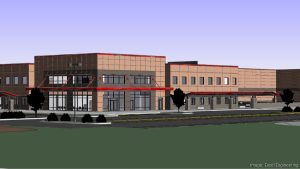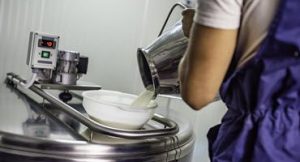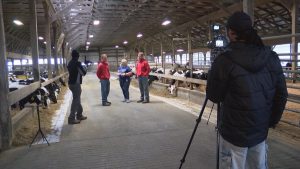
Elected at 18, he will be the youngest lawmaker, perhaps in state history.
“I would rather just have people look at my platform rather than my age, because someone experienced and old might not be as mature as someone young,” said Holle, who ousted longtime Rep. Jim Schmidt, R-Huff, in the Republican primary and bested former Standing Rock Sioux Tribal Chairman Mike Faith this fall for a seat.
Holle, now 19, is one of 41 new members who took office Thursday, and one of several newly elected, younger lawmakers, including some in their 20s and 30s. Lawmakers are gathering in Bismarck this week for the Legislature’s organizational session.
Holle holds a District 31 House seat representing a swath of southwestern North Dakota, including the Standing Rock Indian Reservation.
He touts his agriculture background and says he ran for office to help preserve North Dakota’s dairy industry, citing the 42 dairy farms left in the state, closing at a rate of two or three per year.
“I just couldn’t sit by and watch the dairy industry just perish,” Holle said.
The Mandan High School graduate began campaigning earlier this year while still in school. He went door to door in towns across the vast district.
Holle doesn’t see his age as a barrier.
“I would relate it back to my agriculture background, is that basically time is when the sun goes up and when the sun goes down, and we understand that you have to put in long hours for stuff that you want done, and that I have the determination to get things done,” he said.
In addition to the internship credit, he’ll be taking an accelerated class at U-Mary to keep up with his studies. He is majoring in business management with a minor in political science at the Bismarck school.
‘Always changes’
The Legislature’s three-day organizational session begins Monday, culminating with Gov. Doug Burgum’s budget address to a joint session of the Legislature on Wednesday. Republicans control the Senate 43-4 and the House of Representatives 82-12.
The 2023 legislative session begins Jan. 3, lasting up to 80 days. New Republican majority leaders Rep. Mike Lefor, R-Dickinson, and Sen. David Hogue, R-Minot, will be largely guiding the Legislature, after the retirements of their predecessors.
Sen. Kathy Hogan, D-Fargo, is Senate Democrats’ new minority leader. Rep. Josh Boschee, D-Fargo, will continue as minority leader in the House.
Burgum said he’s already had “good initial reach-out” with the new legislative leaders, whom he noted his administration has worked with in the past.
“As North Dakota has for 133 years, there’s always changes in leadership, whether it’s the governor’s office, elected officials or the Legislature, and I know that we’ve got smart, committed, talented people in the Legislature, and I know that we’re going to be able to work well together to work on the things that are most important to North Dakotans,” the governor said.
Issues such as tax relief and workforce recruitment and retention have already inspired proposals.
‘Want to serve with them’
New Rep. Hamida Dakane, D-Fargo, is believed to be the first Muslim person and first Black woman elected to the Legislature. The Legislative Council does not keep racial, ethnic or religious demographic data on lawmakers.
Dakane came from Kenya in 2012 to pursue a degree at North Dakota State University. She earned a bachelor’s degree in emergency management and international studies. She also has a master’s degree in public administration from the University of Mary.
She had planned to return to Kenya after graduating NDSU but decided to stay after becoming involved in her community.
She’s worked at nonprofits and group homes supporting elderly people and people with special needs. She is a co-founder of the Afro-American Development Association, for which she handles workforce case management.
Dakane ran unsuccessfully for a House seat in 2020. She said she ran again this year “for the same reasons, just to make better for people, and representation, too.”
She noted North Dakota is home to the first mosque built in the U.S., at Ross, but the state doesn’t appear to have had any lawmakers of Islamic faith.
“Not only that, just in general, diversity is not seen as much as we want it,” Dakane said.
The new, younger lawmakers show that young people can serve and do care about issues, she said.
“We have a lot of respect and admiration for … older people. We learn from them, we admire them, but we also want to serve with them and bring the perspective of young people,” she said.
Dakane also is among a gradually growing number of women serving in the Legislature. Women lawmakers have increased from 30 in 2019, to 32 in 2021, to 35 in 2023, or roughly one-quarter of the Legislature, according to a Tribune analysis.
Family trees
The Legislature has a handful of members including newcomers who have followed in relatives’ footsteps.
New Sen. Sean Cleary, R-Bismarck, represents a similar area as his late grandmother, Audrey Cleary, did as a state representative decades ago. His sister, Anne, is a Bismarck city commissioner.
Their grandmother was a role model for him and other relatives, “So I can definitely say her value that she put on service really had a big impact on me and my sister,” Cleary said.
At 31, he will be the youngest in the Senate. Cleary said the new, younger lawmakers help “provide a variety of perspectives as we take a look at the issues facing the state.” He cited his own perspective as a working professional with a 10-month-old child.
“I think that mix of experience and younger perspective is a good thing for the Legislature,” Cleary said.
New Sen. Michelle Axtman, R-Bismarck, is the daughter of House Assistant Majority Leader Glenn Bosch, R-Bismarck. Her husband’s grandfather, Charles Axtman, represented a Jamestown district in the House in the late 1990s.
“I’ve always been interested in serving the state in some capacity, but being able to see what my dad accomplished even as a new freshman legislator … is really what inspired me to want to do the same,” Axtman said.
Bosch and other experienced lawmakers have helped her prepare for the upcoming session, she said.
Axtman, 35, said she’s excited for the Legislature’s new, younger members reflecting North Dakota’s status as a top state for having a young population. She’s also eager to work alongside her father.
“Not saying my daughters will follow, but it’d be kinda cool if they do,” she quipped

























